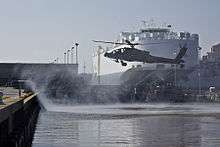Neches River
The Neches River (/ˈneɪtʃɪz/) begins in Van Zandt County west of Rhine Lake[2] and flows for 416 miles (669 km) through east Texas to its mouth on Sabine Lake near the Rainbow Bridge. Two major reservoirs, Lake Palestine and B. A. Steinhagen Reservoir are located on the Neches. Several cities are located along the Neches River Basin, including Tyler, Lufkin, Silsbee, Evadale, Beaumont, Vidor, Port Neches, Nederland, Groves, and Port Arthur.
| Neches River | |
|---|---|
 The KCS Railway bridge over the Neches River in Beaumont is a major transportation link for the region. | |
 Map of the Neches River and associated watershed | |
| Physical characteristics | |
| Source | |
| • location | East of Colfax, Texas[1] |
| • coordinates | 32°30′N 95°45′W[1] |
| Mouth | |
• location | Sabine Lake[1] |
• coordinates | 29°58′08″N 93°51′21″W |
| Length | 416 mi (669 km)[1] |
| Basin size | 10,011 sq mi (25,930 km2)[1] |
| Basin features | |
| Tributaries | |
| • left | Flat Creek Village Creek Pine Island Bayou[1] |
| • right | Bayou La Nana Ayish Bayou Angelina River[1] |
| Waterbodies | Rhine Lake Lake Palestine Steinhagen Reservoir[1] |
Untamed river
With the exception of the manmade lakes, much of the river is in a natural state. For example, from Lake B.A. Steinhagen down to Beaumont, the Neches River flows through the Big Thicket National Preserve. This important ecosphere preserves the area where several ecosystems converge - an event that harkens back to the last glacial period. The Big Thicket Visitor Center is off U.S. Highway 69 several miles north of Kountze.
The Lower Neches Valley Authority is the river authority which oversees the Neches River in Tyler, Hardin, Liberty, Chambers, and Jefferson counties of Texas.
Beginning in 2006, the United States Fish and Wildlife Service purchased land along the Neches River for the creation of the Neches River National Wildlife Refuge. The refuge includes land on which the city of Dallas had proposed to build a reservoir to meet the water needs of the city and its surrounding suburbs. Tentatively named Lake Fastrill, this reservoir was not scheduled to be built until 2050.
The city of Dallas and the Texas Water Development Board filed a lawsuit in 2007 against the U.S Fish and Wildlife Service, claiming the wildlife refuge was established without considering the economic and environmental impacts. However, in February 2010 the United States Supreme Court ruled in favor of the U.S. Fish and Wildlife Service, paving the way for the acquisition of lands for the wildlife refuge.
Industrialized river
The lower forty miles of the river is industrialized, from the Beaumont Interstate 10 bridge to Sabine Lake. The river is maintained as a deep water ship channel running between the Port of Beaumont to Sabine Lake. Currently 40 feet deep and 400 ft wide, the river is being deepened to 48 feet. The total estimated cost of the Sabine-Neches Waterway project is $1.1 billion.[3]
Several petro-chemical plants are located in the river's southern section. The Sabine-Neches Navigation District, formed in 1909, has management responsibilities of the portion of the river which is part of the Sabine-Neches Waterway.[4]
.jpg) Rainbow and Veteran's Memorial bridges near river mouth
Rainbow and Veteran's Memorial bridges near river mouth- View of a portion of Port of Beaumont
- Port of Beaumont looking toward wharfs 5,6,&7
 1st Air Cavalry Brigade Takes Birds to Port of Beaumont
1st Air Cavalry Brigade Takes Birds to Port of Beaumont River view at one of the petro-chemical facilities
River view at one of the petro-chemical facilities
Points of interest
- Lake Palestine
- Neches River National Wildlife Refuge
- B. A. Steinhagen Reservoir
- Big Thicket National Preserve
- The Port of Beaumont is located on the Neches River at Beaumont, Texas. It begins near the mouth of the river and the Rainbow Bridge.[5]
See also
- List of Texas rivers
- USS Neches (AO-5) — a fleet oiler built in 1920.
- Sabine-Neches Waterway
- Lower Neches Valley Authority
References
- "Neches River". Texas History Online. Retrieved October 23, 2015.
- "An Analysis of Texas Waterways". Texas Parks and Wildlife. Retrieved October 7, 2015.
- Dan Wallach (May 22, 2014). "Senate approves Sabine-Neches Project". Hearst Newspapers, LLC. Retrieved October 7, 2015.
- "SNND". Sabine-Neches Navigation District. Retrieved October 23, 2015.
- "Archived copy". Archived from the original on 2011-07-15. Retrieved 2011-01-13.CS1 maint: archived copy as title (link)
External links
- Neches River from the Handbook of Texas Online
- Fun365Days.com -- regional tourism web site
- Partnership of Southeast Texas -- regional economic development site
- Big Thicket National Preserve
- Lower Neches Valley Authority
- Historic photos of Army Corps of Engineers projects on the Neches River from 1910-20s
- Salt Lick Agreement, March 19, 1835 From Texas Tides
- Angelina & Neches River Authority
- Upper Neches River Municipal Water Authority